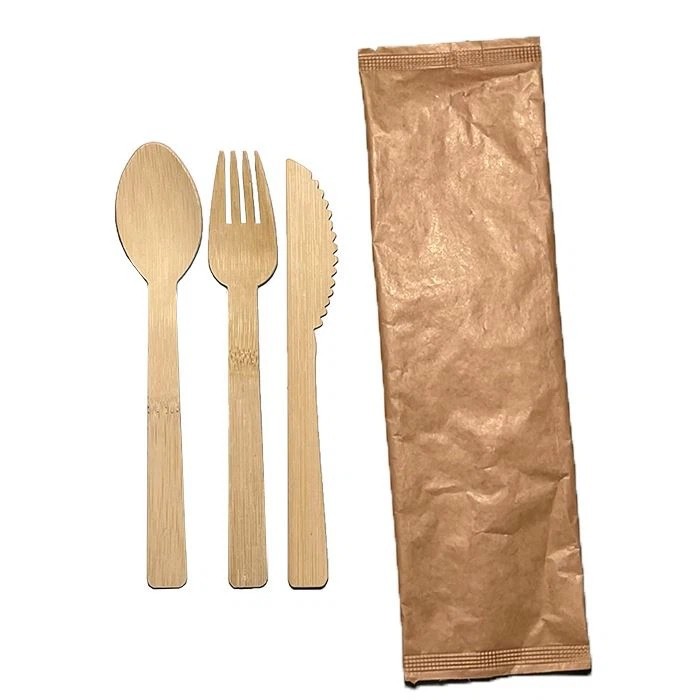Are bamboo knives eco - friendly?
Jun 11, 2025
Hey there! As a supplier of bamboo knives, I often get asked, "Are bamboo knives eco - friendly?" Well, let's dive right into it and find out.
First off, let's talk about the source. Bamboo is an incredibly fast - growing plant. Unlike many trees that can take decades to reach maturity, bamboo can grow several feet in just a single day. Some species of bamboo can be ready for harvest in as little as 3 to 5 years. This rapid growth rate means that bamboo is a highly renewable resource. We don't have to wait ages for new bamboo to grow, which is a huge plus when it comes to sustainability.
When we compare bamboo to other materials used for making knives, like plastic or metal, the difference is quite stark. Plastic is derived from fossil fuels, which are non - renewable resources. Extracting and processing fossil fuels have a massive environmental impact, including air pollution and habitat destruction. And let's not forget about the issue of plastic waste. Plastic knives take hundreds of years to break down in the environment, often ending up in landfills or our oceans, causing harm to wildlife.
On the other hand, metal knives require a lot of energy to mine, refine, and shape. The mining process can lead to deforestation, soil erosion, and water pollution. Additionally, the energy used in metal production usually comes from non - renewable sources, contributing to greenhouse gas emissions.


Bamboo, however, is a natural and biodegradable material. When a bamboo knife reaches the end of its useful life, it can break down naturally in the environment. It doesn't leave behind any harmful microplastics or toxic residues. This biodegradability is a key factor in making bamboo knives an eco - friendly choice.
Another aspect to consider is the manufacturing process. Making bamboo knives generally consumes less energy compared to metal or plastic knives. Since bamboo is a lightweight and relatively soft material, it doesn't require high - energy - intensive processes like melting and forging (as in metal production) or complex chemical reactions (as in plastic production).
Now, let's talk about the durability of bamboo knives. Some people might think that because bamboo is a plant, it won't be as strong as metal or plastic. But that's not entirely true. Bamboo has a high strength - to - weight ratio. With proper treatment and design, bamboo knives can be quite durable and suitable for a variety of cutting tasks in the kitchen. Of course, they might not be as tough as high - end stainless - steel knives for heavy - duty chopping, but they work great for everyday use, like slicing fruits, vegetables, and soft meats.
Moreover, bamboo has natural antibacterial properties. This means that bamboo knives are less likely to harbor harmful bacteria compared to some other materials. It's a great advantage when it comes to food safety and hygiene.
At our company, we're committed to using sustainable practices in the production of our bamboo knives. We source our bamboo from well - managed forests where the growth and harvest are carefully regulated to ensure the long - term health of the bamboo ecosystem. We also use non - toxic finishes on our knives to protect the bamboo and enhance its appearance without causing harm to the environment.
If you're interested in other bamboo cutlery options, check out our Bamboo Handle Cutlery and Eco Friendly Bamboo Cutlery. And for those who love spoons, our Smooth Edge Bamboo Spoon is a great choice.
In conclusion, bamboo knives are definitely eco - friendly. They're made from a renewable resource, have a low environmental impact during production, are biodegradable, and offer several practical benefits. If you're looking to make a more sustainable choice in your kitchen, bamboo knives are a great option.
If you're a retailer or a business owner interested in stocking our bamboo knives, or if you're an individual looking to purchase in bulk, we'd love to talk to you. We offer competitive prices, high - quality products, and excellent customer service. Just reach out to us, and we can start discussing your specific needs.
References:
- "The Sustainability of Bamboo as a Building Material" by Smith, J.
- "Environmental Impact of Plastic and Alternative Materials" by Johnson, R.
- "Bamboo: A Renewable Resource for the 21st Century" by Brown, T.
